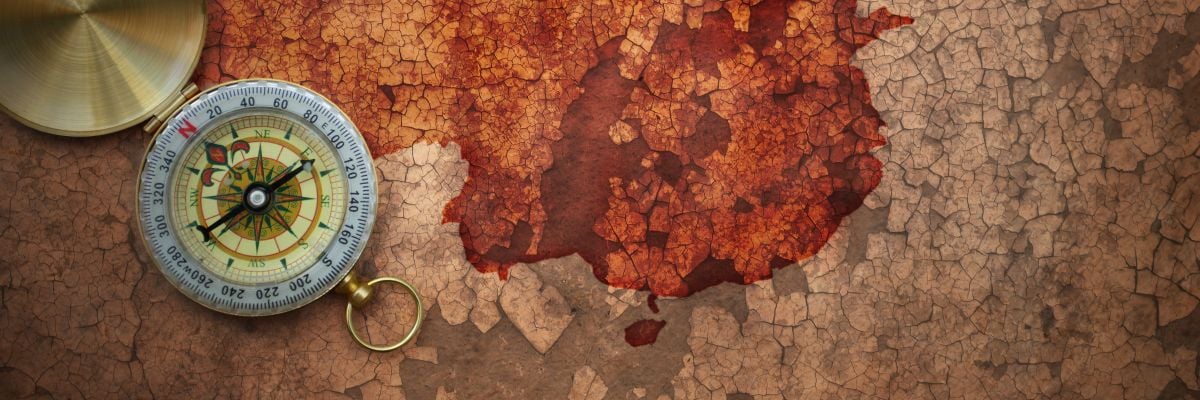
At some point in each person’s life, the way is illuminated by a divine light, perceivable not by the senses but by the soul. He is given the end of a golden string, and is given to understand that it leads to heaven’s gate. But whether he holds fast and follows it or carelessly lets it fall from his g.asp is up to him.
I came across my golden string several times when I was a boy. When I was nearly 16, I was drawn to the sight of a large cross, which turned out to belong to a Lutheran church. This I attended throughout my high school years with ever less devotion until I scarcely noticed that I had lost my way.
In college, I was subjected to a massive dose of Darwinian cant. In reaction, unconvinced by the unlikely argument that life had arisen, proliferated, and evolved into beings intelligent enough to wonder about their own origins solely by chance, I sought the string again. I wound it up for awhile before abandoning it.
I put aside my pursuit of a Ph.D. in biological oceanography in favor of one in cultural anthropology, not fully realizing at the time that I had merely exchanged one form of reductionism for another.
Red Tsunami
I was in my 30th year before I came across the golden string again, in a most unlikely venue. It reappeared before me in the midst of the suffering and blood that marked the birth of China’s one-child policy.
In 1978, China’s dictator, Deng Xiaoping, had just begun to peek cautiously through the bamboo curtain that had long isolated communist China from the rest of the world. He agreed to an exchange of scholars with the United States. The U.S. Committee on Scholarly Communication decided that I was to be the first American social scientist allowed to do research in the People’s Republic of China.
It would be an exaggeration to say that I went to China to join Chairman Mao’s Red Guards. But I was favorably disposed towards Maoism all the same, having been taught by tenured professors that it had been a great boon for the peasantry.
I was welcomed to the village of Xingcha by Secretary Ho who, as the senior party official resident, effectively ran the place. On the evening of March 7, 1980, Secretary Ho (known as “Toad” among the villagers) came over bearing the party directive—marked “secret” as all such directives were—that would radically alter the direction of my life.
The authorities had concluded that the population of the province was growing too rapidly and had decided to impose a cap on population growth of one percent. I said to the secretary, “It’s very clear what you are ordered to do,” I said. “But how are you going to do it?”
“We are launching a planned birth gaochao.” A gaochao, or high tide, was a kind of political tsunami that, like its seaborne counterpart, rises up suddenly and sweeps all before it. “We’ll go from house to house, identifying all the women who are pregnant with illegal children. These will attend study sessions, where they will be told that, for the good of Jun’an Commune, they must get an abortion.”
Slaughter of the Innocents
The gaochao struck the following morning. By midday, Toad and his underlings had rounded up several dozen pregnant women, whom he told to terminate their pregnancies. While some submitted after a day or two of lengthy “study sessions,” others continued to resist his blandishments and threats. On the morning of the fourth day, the 18 remaining holdouts were suddenly arrested and taken away to an undisclosed location.
I went after them, finding them locked up in a small room at the commune headquarters. A commune cadre, Wei by name, stood before these beaten-down creatures, scourging them with his voice.
“None of you has any choice in this matter,” he said slowly and deliberately. “You must realize that your pregnancy affects everyone in the commune, and indeed affects everyone in the country. You who are eight and nine months pregnant will have a caesarean-section abortion; the rest of you will have a shot that will cause you to abort.”
Several of the women started crying at this pronouncement, and Comrade Wei, apparently deciding that his words had had the proper effect, sat down for a while. Other officials were soon at work on the women with alternating barrages of promises and threats.
The actual slaughter of the innocents was done assembly-line fashion. As soon as a woman was brought in, a powerful poison was injected directly into her uterus. Most babies died within 24 hours of receiving this lethal injection and were born dead the day following. Late in pregnancy the drug was proving less effective, however, and some babies didn’t die as planned. In these cases the doctors would open the woman up surgically and remove the now-dead or dying baby.
With the studied callousness of young men who are the principal beneficiaries of the sexual revolution, I had up to this point entirely avoided thinking about the abortion question. For the most part, the young women of my acquaintance believed that contraception, sterilization and, especially, abortion on demand had set them free, a view that I was, I shamefully recall, only too happy to endorse.
Yet now I had witnessed an actual, real-life abortion in all its gruesome detail.
The Bedlam of Unbelief
As I took stock of what I had seen—the killing of full-term, healthy infants at birth, and the poisoning of viable unborn children in the last few weeks of pregnancy, abortions on women against their will, the forced sterilization and contraception of women whose fecundity had been declared a danger to the state—the sense that all of this was truly wicked grew. In the intellectual shadowland I had up to then inhabited, there were no fixed horizons and compass points, only lighter and darker shades of grey.
The discovery that there was Evil loose in the world was a great shock to me. How could God, I asked myself, if he is God, permit such wickedness?
At the time, I was troubled by the recurrent thought that the universe was mad. In my darkest moments during the abortion campaign, it seemed to me that I was simply flotsam in an endless sea of chance and happenstance. I could discern no governing intelligence, no larger pattern of meaning, no ultimate purpose to life—only a world of blind brutality and casual viciousness without end. So be it. Nor did it help that I was behaving as though I was firmly in the camp of the atheists, daily living out the bedlam of their beliefs. Like them, I ate, drank, fornicated, and made merry. It all made it that much harder to avoid the conviction that tomorrow, like the poor naked godless apes that the atheists imagined us to be, we would all fall stone dead.
And yet from the time I was a boy I had felt the tug of something infinitely greater than myself. Now it urged me onward, prompting me to consider whether there might exist a countervailing good to the evil I had witnessed.
Pro-Life Agnostic
By 1983, when I returned to the United States from Asia, I described myself to others as a pro-life agnostic. Several things happened to help me along on my faith journey. One day I received a call from a Catholic priest who introduced himself as Fr. Paul Marx and invited me to speak at his upcoming pro-life conference in Washington, D.C.
The words “pro-life” set off alarm bells in my head. I had been taught at Stanford that pro-lifers were all fetus-loving fanatics who were only too ready to burn down abortion clinics and assault abortionists. Such slanders nearly kept me from accepting Father Marx’ invitation.
What changed my mind was a visit to the National Organization of Women. I had convinced myself that the news that millions of their sisters in China were being forcibly aborted and sterilized would finally be received with the gravity and determination that such outrages deserved. After all, women in China were being denied what NOW leaders regularly declared was the most sacrosanct right of all women, their right to choose. I met with two senior leaders and shared the horrors I had witnessed. The more senior of the two declared with an ineffable rectitude in her voice that will stay with me forever, “I’m personally opposed to forced abortion. But China does have a population problem.” And that was that.
I resolved to speak at Fr. Marx’s conference, pro-life or no. Around this time I stumbled upon the work of Thomas Aquinas, which for me was something akin to finding the Dead Sea scrolls. For just as the scrolls demonstrated the authenticity of the Scriptures, so did the Summa teach me the validity of reasoning one’s way to the Truth, which is God. In reading Aquinas the scales fell from my eyes. Here was a philosophical edifice that not only encompassed all of creation, but also reached up to the very heavens, including proofs for the existence of God.
The End of the String
In the economy of grace that helped to win my salvation, my wife, Vera, played a major, providential role. Taking to heart St. Paul’s admonition that the sanctified spouse should sanctify the unsanctified one, she was everything that love should be: patient and kind, selfless and self-giving and—necessarily given my character—long-suffering. I believe that she intuitively recognized in these early days that preaching at me would be counterproductive, so she did something far more powerful: She prayed for me. I was insensible to these prayers floating heavenward, and she had the good sense not to tell me.
Then came the day we were walking across the plaza in front of the old Spanish mission church in San Luis Obispo, California. Suddenly the bells began to peal, summoning one and all to Mass. It turned out that they were pealing for me as well, for Vera suggested, in that gentle, loving way of hers, that we go to services together. I agreed to attend my first Mass.
It wasn’t until the fall of 1990, after we had resettled in Southern California, that I was finally able to embark upon the nine-month course that would lead to my entry into the Church.
On Easter Sunday 1991, I came into full communion with the Catholic Church. It was a glorious spring day, as I recall, but there was no less glory in the tabernacle of my heart, for I received the great grace of Holy Communion with our Lord for the first time.
And there were years of pro-life work with Fr. Marx that would take us to six continents. But this time did perhaps mark the end of the beginning, a beginning that dated back to March 1980, when I firmly grasped the golden string for the first time. In the meantime I journey on, determined to keep rolling it up into a ball until I arrive safely at the gate of the heavenly Jerusalem. Home at last.



